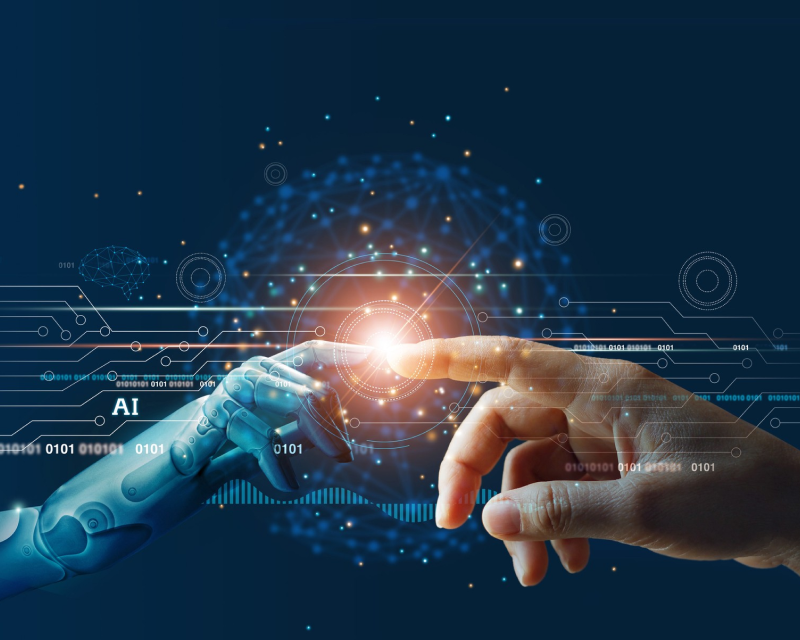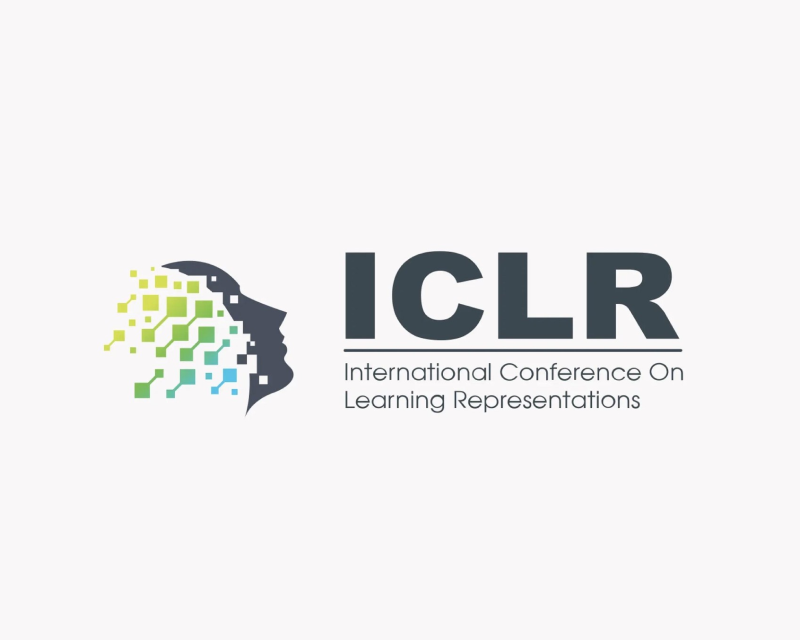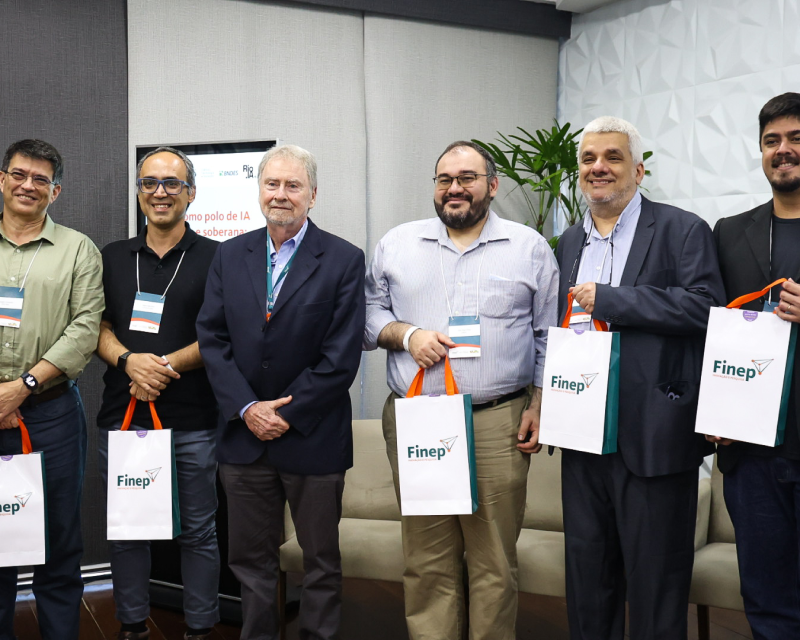UFF Responds: Artificial Intelligence and the Job Market
View Original Article Jun, 27 2024

Increasingly present, Artificial Intelligence can be both beneficial and harmful to workers in Brazil.
Artificial Intelligence (AI) is a field of computer science aimed at developing computational systems that mimic human intelligent behavior, such as reasoning and learning, with various objectives, such as organizing data, generating images, or performing simple functions. Simply put, it is developed through computational algorithms that allow for data manipulation, logical inference, and reasoning.
In the job market, AI raises concerns among professionals who fear being "replaced" due to its efficiency and time optimization, in addition to facilitating the "Uberization" of certain services, such as private transportation and food delivery. However, it can also be applied beneficially, assisting employees with complex tasks that can be performed more efficiently. In this UFF Responds, university experts Mariza Ferro and Paulo Cruz Terra explain AI and its impact on the job market.
What is Artificial Intelligence?
Terra: In very simple terms, Artificial Intelligence (AI) refers to computer systems performing capabilities previously attributed to humans, such as learning, visual perception, and decision-making. This means that AI development involves creating models that enable computers not only to process data but also to learn from it, solve problems, and make decisions.
How does it work?
Terra: The development of AI dates back mainly to the 1950s, with English scientist Alan Turing, and a conference in Dartmouth in 1956, where the term was first used. The goal was to create machines that could imitate or achieve intelligence close to that of humans.
Ferro: In the case of Machine Learning, the most well-known subfield of AI, based on input data sets (the information it receives), AI infers how to generate outputs such as predictions, classifications, recommendations, or new content in the case of generative techniques. This field of study is applied in many domains, such as healthcare, agriculture, climate and environment, economics, and industry. It has recently gained popularity due to publicly available tools like ChatGPT and MidJourney. However, even spam emails automatically filtered into your junk folder have long been selected using AI techniques.
Terra: Information databases are fundamental to AI since one of its basic processes is data processing, especially due to Machine Learning, which allows computers to learn and improve their performance. These databases are currently maintained by humans.
In what situations is AI most applied?
Terra: AI is present in various aspects of our daily lives, from recommendations made by streaming services on our TVs or smartphones to the delivery platforms we use to order food. Additionally, an increasingly common application is in security, where facial recognition technology, for example, is widely used.
With AI becoming more popular, various tools and platforms, such as ChatGPT, are emerging. Should we be concerned about this "fame"?
Ferro: The concern should not be about AI’s popularity but rather about how it is being developed and used—often irresponsibly and without ethical considerations. The main concerns involve violations of human rights, such as freedom and equality, issues related to gender, race, or social stereotypes, manipulation of people based on their psychological vulnerabilities, and its use to influence decision-making, as seen in recent election processes.
Terra: The rapid expansion of AI must be closely monitored by governments, which should also regulate it. Like other forms of technology, AI is neither neutral nor exempt from influence, despite some claims to the contrary. It is tied to various interests. Therefore, it is crucial to understand AI’s potential while ensuring that the rights of the population are protected—one key right being privacy.
Regarding professional relationships, how does this technology transform the job market?
Terra: The introduction of AI in labor relations has had multiple effects, one of the most significant being the rise of digital platforms, such as delivery and ride-hailing apps. This impact is so profound that the term "Uberization" or "platformization" was coined to describe the effects of AI on labor relations, affecting not just transportation but also industries like healthcare and education.
Ferro: There is a forecast of significant job reduction, with major impacts in Latin American countries. According to the Organization for Economic Co-operation and Development (OECD), 25% of jobs in Latin America could be affected by automation with AI technologies, with approximately 30 million jobs at risk in Brazil by 2026. More than half of all jobs in Brazilian municipalities could be threatened by 2040. The most affected professions will be those involving repetitive tasks and low education levels, but even fields like journalism and marketing could be impacted. Automated AI systems may replace some professions, but new ones will likely emerge, requiring a higher level of education.
How does this technology weaken labor relations?
Terra: The effect of Uberization on labor relations is that digital platforms act as intermediaries between workers and consumers. As a result, workers are classified as self-employed or freelancers, and the platforms are not legally considered employers. The direct consequence is that platform-based work offers no labor rights. However, these platforms often have control and punitive mechanisms over workers while disclaiming any responsibility for guaranteeing their rights. Meanwhile, platform companies generate enormous profits from workers’ services.
The impact of AI on the job market today is an intensification of labor precarization, meaning an increasing number of workers lack basic rights such as paid vacations or health benefits. Concerns about certain professions disappearing or being replaced by AI are valid. For example, translation work is increasingly performed by highly efficient AI systems, replacing human translators. Similarly, AI-driven systems are beginning to replace voice actors. Many other professions face the risk of AI replacement in the near future.
On the other hand, how can AI be applied positively for workers?
Terra: AI can optimize certain work processes, making them more efficient. This means that certain work tasks can be simplified with technology.
Data processing and analysis, which provide insights and potential solutions, can assist in logistics, inventory management, and product quality control. However, I emphasize that such optimization should align with the protection of workers' rights.
Some studies suggest that AI development could lead to shorter work hours. Do you believe this will actually happen?
Terra: The idea that AI development will reduce work hours seems doubtful when we look at the impact of past technologies. The same was said about the introduction of the internet, but in many cases, it has intensified work rather than reduced it. Today, the internet allows people to work from anywhere, at any time. The efficiency AI brings primarily benefits business profits rather than improving working conditions.
Following the Hollywood writers’ strike last year, other movements have emerged advocating for AI usage limitations. What is the impact of these movements? Do you think they will continue to grow?
Terra: History shows that workers have often sought ways to fight for job security and rights. We are now witnessing a movement where workers worldwide are voicing concerns about AI’s impact. In Brazil, for example, we have seen the "Breques dos Apps" (app delivery worker strikes), where couriers demand labor rights. These mobilizations are crucial in presenting workers' perspectives on ongoing changes and pressuring authorities to uphold labor rights. In some European countries, such as Spain, England, and Portugal, workers' movements have achieved significant victories.
Can the government’s platform regulation initiative help protect labor relations amid AI advancements?
Terra: It is essential for governments to consider AI regulation across various sectors, including public security. Regarding labor relations, regulation is crucial to ensuring basic workers' rights. In several European countries, governments have recognized the rights of platform workers. For example, in 2021, the UK Supreme Court ruled that Uber drivers are not independent contractors but employees entitled to labor rights. Similarly, Spain ruled that app-based delivery workers must be legally considered employees with full labor protections. Brazil should actively participate in international discussions aimed at securing labor rights in the AI-driven job market.
Mariza Ferro is a professor at the Institute of Computing at Universidade Federal Fluminense (UFF) specializing in Artificial Intelligence (AI). She coordinates the Reference Center for Ethical and Trustworthy AI and the Public Policy Consortium for Ethical AI (EticALIA). She is also a researcher supported by the Serrapilheira Institute and a member of the Brazilian Computer Society (SBC), serving on the Education Committee (2023-2025). Additionally, she is a member of the Association for Computing Machinery (ACM) and the Research Ethics Committee at UFF’s School of Medicine.
Paulo Cruz Terra is a professor of Brazilian Republic History in the Department of History at UFF and a researcher in its Graduate History Program. He is a board member of ANPUH-RJ and the Society for Eighteenth-Century Studies (SEO). He is also an editor for the “Social History of Punishment and Labour Coercion” series at Amsterdam University Press and a board member of the “Work Around the Globe” series in partnership with UCL and the International Institute of Social History.


